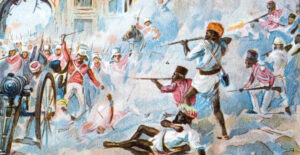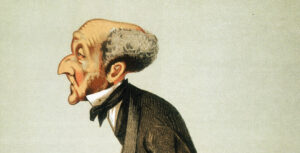Of all historians, living and dead, one has changed the way we think about history more than any other. Yet he remains curiously absent from feuilletons and podcasts. Terry Deary has never been one for self-promotion. So although anniversaries are customarily celebratory, it is only fitting that, on the tricenary of his Horrible Histories, we quickly pass over the scale of his achievement, obvious by any standards — 270 books; north of 35 million copies sold; West End productions; television spin-offs; “interactive” boat tour — and home in on the aspect of his work that has been curiously neglected: his politics.
To be considered national treasures, and indeed to truly capture the national imagination, children’s authors paradoxically need a loyal adult readership to supplement their youthful one. But Deary has never enjoyed the crossover audience of a Pullman or a Rowling. Nor has he advertised his politics the way his antipode, Roald Dahl, once did (“Even a stinker like Hitler didn’t just pick on [the Jews] for no reason”). Scarcely a jot is known about the anchoritic Deary. Only kids read — more accurately, worship — him. The adults they grow up to be might hazily remember the guts and gore, piss and shit — but not his worldview, internalised at an undiscerningly early age.
The Marxism of Horrible Histories, then, has flown under the radar. Deary himself is aware of this. Likening himself to a “sneaky propagandist”, lacing his tales with subversive ideas, he takes pleasure in his camouflaged transgressions: “I’m poisoning the minds of children.” His invitation is always the same: come for the ribaldry, stay for the radicalism. Beneath the comical carnage (“history with the nasty bits left in”) and Mailesque addiction to alliteration (Rotten Romans, Vile Victorians, Groovy Greeks, Vicious Vikings) are hymns to the pluckiness of the common man.
When asked by The Times to name his favourite historical figure, Deary replied “Mr and Mrs Peasant” — better than some “bloke stuck on a column in Trafalgar Square”. Accordingly, he’s rather sympathetic to the peasants who beheaded the archbishop of Canterbury in 1381: the clergy had it coming, extracting free labour and tithes from serfs. “Just to rub in the fact the Church was making a fortune, the bishops stored their ill-gotten goodies in huge tithe barns,” he writes in The Peasants’ Revolting Lives (2020). “Imagine if you were a hungry peasant walking on your way to your frozen field and having to walk past that barn stuffed with the bishop’s food,” he asks his reader. “These tithes and their monstrous barns may explain why peasants targeted the clergy when they rose.”
Deary, of course, is a republican. “Slimy Charlie thought he could rule without” Parliament, he says in The Slimy Stuarts (1996), explaining why Charles I “got the chop” in 1649. When the late “Lizzie the Last” (“because the monarchy will never survive Charles”) visited Durham, Deary turned down a meeting: “Sod the Queen.” Years later, he had this to say to the Guardian: “My top character is Margaret Wilson, a Covenanter from Scotland, who preferred to drown rather than say God save the King.” The honours system elicits a similar reaction: “Knighting people who’ve done bugger all, while carers [and] nurses get no recognition at all. It breaks my heart.” Class conflict, for Deary, was key.
Imperialism, it seems, is just as awful as the monarchy. “Brutal Britannia” was, along with Belgium, “one of the most evil empires in the world”. Barmy Britain (2008), his most impassioned book, chronicles the “dreadful deeds down under”, the decimation of the entire population of Tasmania — some 20,000 aborigines — by British guns and germs in the nineteenth century. This at a time when more Brits than not were “proud” of empire. In Deary’s account, empire was not about saving souls or preaching progress but rather “money, money, money”. The Royal Navy’s victory in the Opium Wars made “Brit drug dealers very rich … and the Chinese very dead”.
Crucially, Deary’s history isn’t just a dreary tale of oppression. He emphasises native agency. We get a life story of, for instance, the freed slave Olaudah Equiano, whose gut-wrenching memoir — liberally quoted in Barmy Britain — went a long way in securing abolition. Kids, by contrast, are taught an altogether different story in school, one that the economic historian Eric Williams encapsulated when he wryly remarked that it is “almost as if Britain introduced Negro slavery solely for the satisfaction of abolishing it”. Deary takes a dig at “batty Boswell”, who defended slavery on the ground that slaves were a “cheerful” lot that liked their station: “Of course, Mr Boswell wasn’t a slave, was he?”
Deary’s distaste for the establishment derives from his own personal history. Born in post-war Sunderland — father a butcher in a slum, mother a shop manager — Deary is from “a terribly poor background”. He recalls an unhappy childhood, being “beaten, bullied, and abused at school by the teachers, not the pupils”. His hostility to authority and formal schooling was carried into adulthood. Indeed, it can be felt throughout Horrible Histories. The series’ conceit — always — is: here’s the “real history” your teachers have kept away from you.
Deary has elaborated on the theme in interviews, describing schooling as “an ancient Greek idea that the Victorians borrowed to get kids off the street. It’s fundamentally wrong.” These days, “a bunch of clueless muppets in Whitehall are determining what children learn”. To what end? To “pass your exams so you can get a job and make money and be happy. What a lot of codswallop.” He would rather not be read than wind up on a reading list: “I shudder when I hear my books are used in those pits of misery and ignorance.”
Deary’s ideal reader, then, is a child rather like him: a sceptic tired of being hoodwinked, and talked down to, by the establishment. Both the style and substance of Horrible Histories reflect his penchant to stick it to condescending elites. “I’m not a historian…I want to change the world,” he says, echoing Marx. “Attack the elite. Overturn the hierarchy. Look at my stories and you’ll notice that the villains are always, always, those in power. The heroes are the little people. I hate the establishment. Always have, always will.”
This, needless to say, is particularly refreshing in a land whose popular historians are overwhelmingly of aristocratic stock, excepting the odd Home County and North London subaltern — public schoolboys to a man. Think Hugh Thomas, David Gilmour, and John Julius Norwich. Deary, meanwhile, was apprenticing as a butcher from the age of three, and spent his mid-twenties touring rural Wales with a theatre troupe. Acting, however, was not his calling. He settled in Suffolk, teaching drama and moonlighting as a writer. Fifty titles appeared in half as many years. Success came late.
It was only in his late-forties, in 1993, that the first Horrible Histories were published: Terrible Tudors and Awesome Egyptians. Fame and fortune followed two years later, with Blitzed Brits, timed for the 50th anniversary of VE Day. The story of blunders from on high with devastating consequences for ordinary people, children agreed, was bracing when contrasted with the blimpish jingoism of conventional histories. Its pendant, The Woeful Second World War (1999), tackled the Holocaust, substituting instruction for humour — never a key ingredient in Deary, for whom politics comes first. Indeed, quips and gags are secondary in Horrible Histories.
Beyond the pale in Thatcher’s time — a time of riots in Brixton, Section 28, and imperial adventurism in the Malvinas — Deary’s politics are not unusual, and in fact fairly palatable, nowadays. For the last 30 years have witnessed an astonishing liberalisation of social attitudes. Racism, homophobia, xenophobia, religious belief, support for the monarchy — all are on the decline. The years bookended by the publication of the first and most recent Horrible Histories have been marked by nothing less than the collapse of social conservatism. There’s a correlation here; of course, a causation mustn’t be assumed. It is, all the same, fair to suggest that, on account of his impressively robust sales and impressionably young audience, Deary has played a greater part in shaping public opinion than most public intellectuals have. Indeed, he belongs in the company of Christopher Hitchens and Anthony Giddens.
For some hundred years now, Marxist historians have preoccupied themselves with, in E.P. Thompson’s celebrated phrase, rescuing the lower orders from “the enormous condescension of posterity”. A few of them have done so with remarkable success. Eric Hobsbawm’s histories of brigands and peasants, for instance, are read in garrets and grandes maisons from São Paulo to Shanghai. Yet a truly mass following has been wanting: not a million readers scattered across capitals but tens of millions in a single country. It is the latter that counts for impact.
Ruled for all but 31 of the last 100 years by the Tories, Britain is unquestionably a conservative country. This is reflected in historical tastes: the lower sort of biography turning on the lives and wives of great men; sporting and starlet hagiographies; an instinctive suspicion of social history. For the Left and its historians, breaking into bestseller lists has always been a Sisyphean task.
The Italian Marxist Antonio Gramsci used to carp about the “cultural hegemony” of the ruling elite, which gave it an edge in class conflict, shepherding mass aspirations through the tamer channels of politically disengaged entertainment. In his homeland, this became dispiritingly true in the age of Berlusconi, by which time the Left was vanquished and a television audience hooked on watching seemingly demure housewives take their clothes off on his networks.
Britain has been somewhat luckier. No, the Left has never enjoyed cultural hegemony in this sceptred isle, but it has one rather formidable champion of mad, bad, and dangerous Brits in Terry Deary, a Marxist culture warrior avant la lettre. Who knows, perhaps someday the English Civil Wars will more widely be known as the English Revolution.
Disclaimer
Some of the posts we share are controversial and we do not necessarily agree with them in the whole extend. Sometimes we agree with the content or part of it but we do not agree with the narration or language. Nevertheless we find them somehow interesting, valuable and/or informative or we share them, because we strongly believe in freedom of speech, free press and journalism. We strongly encourage you to have a critical approach to all the content, do your own research and analysis to build your own opinion.
We would be glad to have your feedback.
Source: UnHerd Read the original article here: https://unherd.com/



